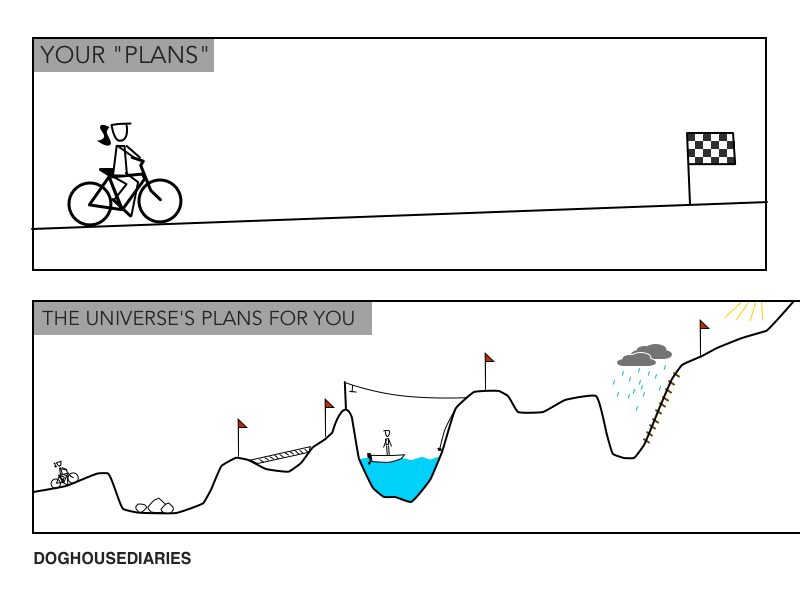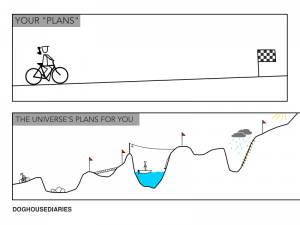Congratulations, you survived! Ok, that may be a bit overly dramatic, but yesterday (20th of January) was apparently the saddest day of the year in the northern hemisphere, and we are through it! Achievement unlocked, as my kids would say.
The new year is a good opportunity for a reset, be it at work, or in your personal life, but by this point in January the initial enthusiasm of those New Year’s resolutions has worn off, and reality has set in. Now is the time to make those changes stick and get down to some serious planning. The key is to set some sensible goals, track them (did I mention Milestone Planner yet?) and then adapt to the changes which inevitably happen along the way. Sometimes things don’t go according to plan (we love this Dog House Diaries cartoon), but that is ok.
Friend and author, Jean Russell, recently shared this post from Entrepreneur magazine: Forget Setting Goals. Focus on This Instead. It is one of those slightly intriguing, clickable headlines. If you haven’t read it, let me summarise for you: Systems are more powerful than goals. Goals won’t serve you or make you happy, because you can’t control everything, and because things change. While the article has some interesting points, I don’t agree with it. The key to effective goals is to understand how they serve you, and their role in shaping what happens.
“Would you tell me, please, which way I ought to go from here?”
“That depends a good deal on where you want to get to,” said the Cat.
“I don’t much care where–” said Alice.
“Then it doesn’t matter which way you go,” said the Cat.
“–so long as I get SOMEWHERE,” Alice added as an explanation.
“Oh, you’re sure to do that,” said the Cat, “if you only walk long enough.”
(Alice’s Adventures in Wonderland)
Goals help you to build the right systems
Picking goals enables you to define and build the right systems. Goals don’t just happen, they require a process of identifying and completing specific actions (we very deliberately use the word ‘actions‘, rather than tasks here). Completing the actions moves you towards your goal. Similarly, actions do not (reliably) happen on their own, they need a system, or structure, to support them – actions and goals are not enough. In the Entrepreneur article, James Clear talks about the need to “build feedback loops” – this is where milestones come in. Setting milestones helps to break the progress towards goals into digestible chunks. As well as being easier to identify specific actions towards, Milestones enable you to see your progress more clearly. Just as importantly, they help you to see a lack of progress too. Here is where my perspective on goals starts to differ from many…
Goals are a hypothesis.
At the point that a goal is set, it is not always clear that it is the optimal goal, or that it is achievable. In times of rapid change, it is hard to set goals, as the uncertainty makes it difficult to commit to a direction as “the right one”. That doesn’t mean that we should not set goals! Let me remove the double negative from that last sentence: That means we should set goals. Remember, without goals, how are you going to pick systems or choose purposeful actions?
Selecting one goal means unselecting many others. That one truth is at the heart of so many business and personal problems. By saying “yes” to one thing, we are forced to say “no” to others, by avoiding the decision we are pretending that everything is a possibility, while pursuing nothing in particular. Choices are hard, and even harder when constant change makes everything appear risky. So often, business leaders want to pursue every single strategic opportunity, and individuals unhappily flip-flop between conflicting directions. Making a choice and committing to a direction,means accepting the risk you might be wrong. That turns out to be a good thing. You cannot do everything, because you do not have that level of resource available to you! Bill Gates is, at least from time to time, is the richest man on the planet, yet even with access to that level of resource, he and Melinda Gates focus their efforts to make a difference.
Often, the only way to know if a goal is the right one, is to pick it and pursue it. We test the hypothesis, or rather the goal tests the hypothesis and the desire behind it. Does the company want to be the largest in the market? Or does it actually want to provide the best service? Company goals, just like personal ones, are driven by a desire and a hypothesis. We don’t have to wait until we achieve, or fail to achieve, the goal to discover if the hypothesis was correct. If milestones are not being met, that isn’t failure, it is feedback. Was that the right goal? Is it in conflict or contention with another goal? Which leads me on to…
There are two types of goals – ones you know and ones you don’t
OK, there are three – There are the ones that you don’t know that you don’t know. Goals are always present, but they are either explicit (they are clear and people can see them) or they are implicit (they have not been surfaced). Just to add a little confusion, sometimes implicit goals can be explicit ones masquerading in non-communication, where you know what your goals is, but you have not shared it with me. If members may have explicit goals set by the team leader, but they don’t share them with each other, the goals are still drawn implicitly in how the team members interact with each other and the rest of the organisation. Similarly, if I have an implicit goal in my behaviour that I am unaware of, it still shapes what I do and how I behave towards others. I am a big proponent of sharing goals, for two reasons:
Shared goals are identified and validated
You can’t write it down if you don’t know what it is! A commitment to sharing goals implies a commitment to defining them. Most behaviour has some form of goal behind it, it is just that we have not identified it yet. Even the simple act of walking to the kitchen, picking up a biscuit and eating it. Similarly, if a business doesn’t like what its sale team is doing, the starting point for change is not the behaviour, it is the (possibly) hidden goal that is driving the behaviour. If I understand somebody’s goals, I am more likely to understand their behaviour, and more able to cooperate. “I don’t understand why he did that” is a point of friction, just as “I don’t understand why I did that” is… Goals are an attempt to make sense of the world, and an attempt to make the work make sense. Yes, there are some things that can not be changed or controlled, but there are others that can. Sharing the goal with others allows for reflection, and often leads to support in reaching the goal.
Defining goals identifies conflicts before the fight
Kevan Hall, CEO of Global Integration, had me thinking about this last year. Goals usually don’t conflict, they contend or compete with each other. In psychological research people will talk about evidence that conflicts, coexists or compliments. It is a useful model for understanding goals as well. “Close down the London office” and “double the size of the London office” are in conflict. Conflicting goals are rare, but where they appear, process will be limited until the conflict is resolved. Hidden goal conflicts are toxic, both at the business and at the personal personal level, the sooner they are identified and addressed, the better. More often, goals coexist or compliment.
Complementary goals are often surprisingly problematic, they are complementary because they overlap slightly, and that usually means that they compete for resources and attention – they contend with each other. Good planning is key to identifying that contention, and mitigating against it. As soon as we have more than one goal, there is always going to be some degree of contention, we only have so many hours in a day, so we have to accept and manage that – or focus on a singular goal (but that is a whole other post).
Goals that coexist are also not without their problems. They can create independence, rather than interdependence, and lead to fragmentation and inefficiency. Complementary goals, in their overlap, carry synergies. It is a much misused word, but synergy is key to achieving goals, reducing friction and creating efficient actions. It gets more done.
synergythe interaction or cooperation of two or more organizations, substances, or other agents to produce a combined effect greater than the sum of their separate effects.
Goals are a poor master, but a good servant
It should be fairly obvious that if we slavishly hold ourselves to undesirable, out-dated goals, that they are not going to serve us well. Goals need to be periodically reviewed and reset. The start of the year seems like a particularly good time to do that, if you haven’t already. Setting goals is a useful tool for identifying where resource limitations are going to be a challenge, and where there may be either conflict, or opportunities for collaboration. Creating markers (milestones) towards the goals helps to create a sense of achievement and progress, or to flag where the hypothesis of the goal is flawed or has been invalidated by a change in circumstances. Do not give up on goals, renegotiate them. Sometimes a small change in direction is all that is required to make a big change.


